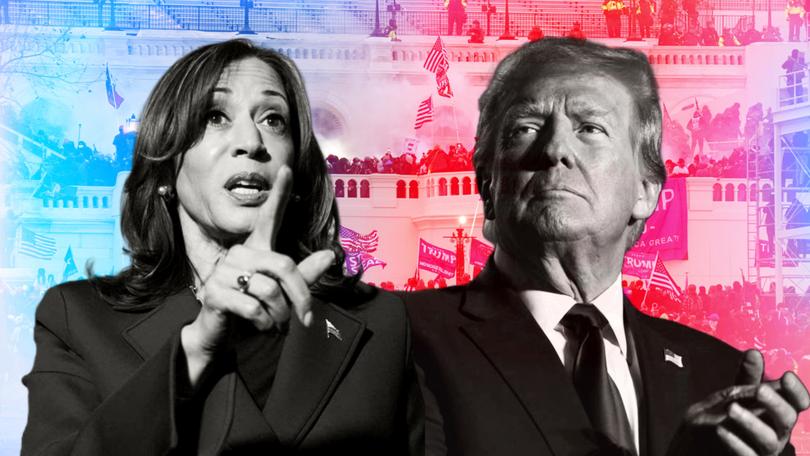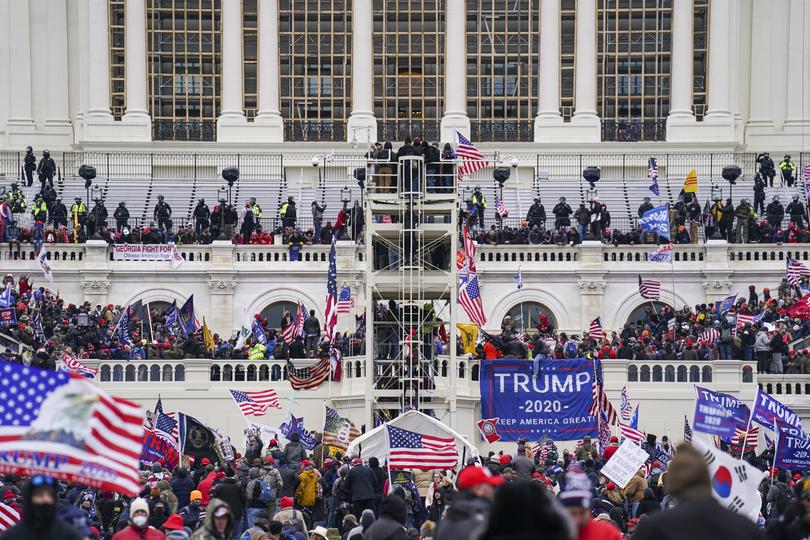No matter who wins the US election, a battle looms that could be America’s biggest crisis since the Civil War
ANDREW NEIL: Even the most savvy of US election-watchers are sure of only one thing: whoever wins, it’ll be very close. And that’s why America faces a crisis of epic proportions.

“The US presidential election of 2024 started as a dead heat,” a shrewd observer of American politics said to me this week. “And it’s even closer now.”
That’s a pretty good summary of where we are, with under two weeks until election day.
True, even the Kamala Harris team senses things might be slipping away from her as their candidate loses the traction she had earlier in the campaign and fails to gel with the voters she needs to win.
Sign up to The Nightly's newsletters.
Get the first look at the digital newspaper, curated daily stories and breaking headlines delivered to your inbox.
By continuing you agree to our Terms and Privacy Policy.Team Trump insists the pollsters are still not picking up the true strength of his support among working-class voters which, given just how close the polls are nationally and — more importantly — in the swing states, bodes well for Donald Trump, if true.
But even the most seasoned and savvy of US election watchers are really sure of only one thing: whoever wins, it will be very close. And that, dear reader, is why America faces the grim prospect of a constitutional crisis.
The closer the result, the more likely it will be contested by the losing side.
The 2020 presidential election was close enough and Trump and his acolytes are still claiming he won, even if nobody else agrees. This year could be even closer.
Nobody is any doubt that, if Trump loses narrowly again, we’re in for a repeat performance. I don’t claim there will be another storming of the US Capitol by a violent mob, as there was last time Congress met to ratify the result. That’s very unlikely. But there will be multiple legal challenges designed to undermine the result and the threat of unrest may well be just below the surface.
The difference this time is that, if Trump wins narrowly, Team Harris will almost certainly use the same legal guerrilla warfare as Trump in 2020. Democrats and Republicans are already lawyered up to the hilt in anticipation of a post-election standoff.
Both sides have hired hundreds of expensive lawyers, backed by thousands of volunteer lawyers, to contest any close results. Team Trump is already far better organised and funded than it was four years ago to mount legal challenges on a grand scale if the election doesn’t go his way.
Teams Trump and Harris are lawyered up to the hilt
Republican donors have stumped up more than $US140 million (more than $211 million) to nearly 50 groups working on what they call “election integrity”.
“We are preparing for all possible scenarios,” says a member of Trump’s legal team, adding they’ve been working “uninterrupted” for four years on it. They’ve already taken out at least 130 lawsuits to make sure, they say, votes are counted properly.
The Democrats claim they’ve had to lawyer up, too — with some of the most expensive lawyers in the country, let it be said — just to foil the expected Republican legal onslaught.
But, if Trump enjoys only a narrow victory, it seems more than likely the Democratic army of lawyers would quickly be transformed into an offensive force to undermine a Trump victory. Former President Obama has already issued an appeal for even more lawyers to rally to the Democratic cause.
So, in the days after November 5, whether it’s Trump or Harris who is thought to have just scraped over the winning line, that will not be the end of the matter. As the lawyers have their many lucrative days in numerous courts, the final result could be weeks away from being determined.
Congress is meant to ratify the electoral college result on January 6, in good time for the new president’s inauguration on January 20.

Four years ago, Team Trump launched more than 60 lawsuits in various states aimed at denying Joe Biden victory. All of them failed, even when the judge was a Republican or a Trump appointment. But this time the legal action will be far more extensive. There are no guarantees it will be resolved by January 6, potentially leaving it undetermined who the new president would be.
Like four years ago — but on a far grander scale — local officials will be pressured to “find” more votes, claims of fraud will be everywhere, some states might even end up with competing electoral college slates. In the event of a narrow Trump win, the vice president might even be urged not to ratify the results, as Mike Pence was last time. This time, of course, the VP is Kamala Harris.
The longer it takes to resolve the matter, the more some on the extremes of Left or Right will be inclined to take matters into their own hands. That is why I speak of a potential constitutional crisis engulfing the country.
Unlikely to happen? Maybe. But it has nearly happened before.
In the 1876 presidential election, just over a decade after the end of the Civil War, the winner could not be established because four states — Florida, Louisiana, South Carolina and Oregon — sent competing slates of electoral college voters.
It was agreed that Republican Rutherford Hayes had 165 electoral college votes and Democrat Samuel Tilden had 184. In those days you needed 185 to win. There were 20 disputed votes from the four states with competing slates. So Hayes needed all 20 to win.
After much horse-trading, which resolved nothing, a commission was established to decide how to apportion the contested 20 votes. Inauguration day was fast approaching and still there was no winner.
Outgoing President Ulysses S. Grant, a Civil War hero for the North, quietly posted soldiers around Washington’s perimeter, as there were reports of armed gangs descending on the capital.
In the end, the slight Republican majority on the commission gave Hayes all 20 of the votes he needed for victory. He became the 19th president of the USA. But at a terrible price.
In what was dubbed the Compromise Of 1877, the Democrats insisted that the South was effectively returned to them, a demand that was shamefully granted.
Since the Civil War, federal troops and administrators had given freed black slaves a degree of civil, political and economic rights in what became known as the Era of Reconstruction. The Compromise ended that.
All remaining federal troops were pulled out of the South, its old slave-owning ruling class was restored to power and the Southern states descended into white supremacy, racial segregation, poverty, lynchings and disenfranchised black communities for almost a century thereafter.
Not quite a return to slavery but not a huge improvement for most poor black people either — and it largely stayed that way until the reforms sparked by the Civil Rights movement of the 1960s.
That’s how America resolved its last constitutional crisis when there was gridlock over to whom power should be transferred. Who knows what the price might be this time?
The country is more divided than ever.
Trump, of course, set a terrible example four years ago. He could do it again this year — but this time others might be happy to emulate him.
There was a time when American politicians cleaved to a higher standard. Richard Nixon in 1960 and Al Gore in 2000 both had stronger grounds for contesting their narrow defeats than Trump had in 2020. But both decided to put the country first by being prepared to concede they’d lost.
Somehow, I don’t see that happening this time, whether Trump or Harris is the narrow loser. The country is more divided than ever and both parties are too much in thrall to their extremes.
American democracy could face a huge test in the weeks ahead. The defining hallmark of a democratic society is the peaceful transfer of power in accordance with how the people have spoken in an election. America stumbled at that hurdle four years ago but still managed to make it over the line. Democracy remained intact.
This year that same hurdle could be even higher. The US Constitution could face its greatest challenge since the Civil War broke out in 1861.
Four years ago, the courts and the judges did their job and the system functioned as it is meant to. The rule of law prevailed.
I am optimistic enough to expect a repeat performance, after some rough, wrong turns. But it is hard not to be fearful.
